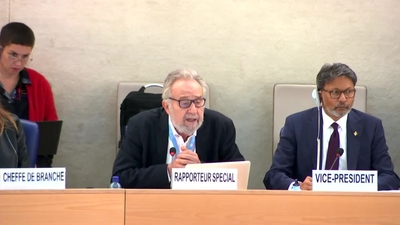GENEVA – The UN Special Rapporteur on the human rights to safe drinking water and sanitation, Pedro Arrojo-Agudo, will visit Canada from April 8-19, 2024.
The Special Rapporteur will meet with representatives of federal and provincial governments, civil society organizations, Indigenous Peoples, businesses, as well as academic and individuals in Ontario, Nunavut, British Columbia, and Alberta.
Arrojo-Agudo will examine issues of concern related to the human rights to safe drinking water and sanitation, including but not limited to availability, accessibility, quality and safety, affordability, and acceptability of water for drinking and personal, as well as domestic usage and sanitation. The expert will also explore issues related to the human rights to safe drinking water and sanitation, including environmental issues, use of surface or groundwater sources, and water pollution, with particular attention to toxic contamination.
Arrojo-Agudo will share his preliminary findings at a hybrid press conference on Friday, 19 April, at 11.30 am (ET) at Lord Elgin Hotel, 100 Elgin St, Ottawa.
The Special Rapporteur will present his final report on the visit, including findings and recommendations, to the Human Rights Council in September 2024.
Mr. Pedro Arrojo-Agudo is the Special Rapporteur on the human rights to safe drinking water and sanitation. He was appointed by the Human Rights Council in September 2020. From 2016 to 2019, Mr. Arrojo-Agudo served as an elected member of the Spanish Parliament. He was Professor in the Area of Fundamentals of Economic Analysis at the University of Zaragoza from 1989 to 2011 and has been professor emeritus since 2011. During the last three decades, he has focused his research on economics and water management, publishing his work in more than 100 scientific articles and in 70 books.
The Special Rapporteurs are part of what is known as the Special Procedures of the Human Rights Council. Special Procedures, the largest body of independent experts in the UN Human Rights system, is the general name of the Council’s independent fact-finding and monitoring mechanisms that address either specific country situations or thematic issues in all parts of the world. Special Procedures’ experts work on a voluntary basis; they are not UN staff and do not receive a salary for their work. They are independent from any government or organization and serve in their individual capacity.









